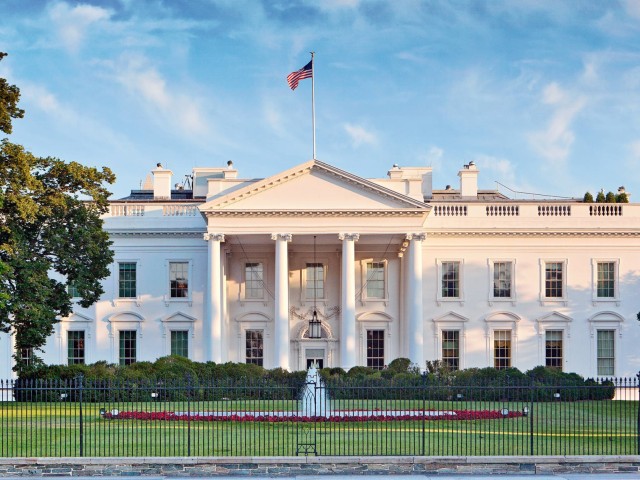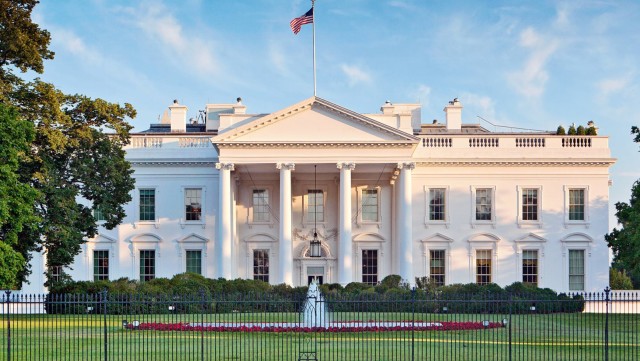April 25, 2025
Postcard from Washington, D.C.
Erratic US-policymaking overshadows the Spring Meetings.


Today, I am writing to you once again from Washington, D.C., where I am attending the Spring Meetings of the World Bank and the International Monetary Fund (IMF). The atmosphere is peculiar. The sun is shining, and delegates are trying to convince each other that somehow or other things won't turn out so bad. Yet, there is really only one topic of conversation: What surprise will Donald Trump spring next? This week it appeared like he might back down a bit in his harsh stance towards China and the Federal Reserve. The markets have celebrated that. But tomorrow, everything could look completely different. To summarize in one sentence what many delegates think: expect the unexpected!
The fear of one step too far
In the quarter-century that I have participated in this annual gathering of global finance, I have only once experienced such degree of disorientation. That was during the financial crisis starting in 2008. But this time, one thing is different: the deep worries today are not the result of a sudden exogenous shock to the world economy. Rather, they are. The fear is almost palpable that the US President, in his erratic manner, might overstep and set in motion developments that he can no longer simply retract through his now almost customary backpedaling. Due to the extraordinary uncertainty, the IMF has been forced to take the rare step of calculating various forecasts for the global economy. One for the tariff scenarios before “Liberation Day” April 2, one for the situation after April 2, and one for a post- April 9 world, when Trump temporarily paused the so-called reciprocal tariffs for all countries bar China. Anyone who deals with forecasts knows how the IMF economists must have cursed that the parameters keep changing. But why should they fare better than us at LBBW Research?
Real GDP growth 2025, annual change in %
| County | IWF Forcast | LBBW Forcast |
|---|---|---|
| World | 2,8 | 2,4 |
| US | 1,8 | 1,0 |
| China | 4,0 | 3,2 |
| Euro Area | 0,8 | 0,0 |
| Germany | 0,0 | -0,5 |
Source: IWF, LBBW Research
The IMF has reduced its expectations for global economic growth this year to 2.8%. That's 0.5 percentage points less than assumed as recently as January. During this century growth was only lower than that during the recessions of the financial, euro, and pandemic crises. The IMF has also revised down the growth forecast for next year. The reason is obvious: international trade expansion is screeching to a near halt, depressing economic dynamism globally. Thank you, Donald! But the IMF colleagues don't point fingers at the man who lives just three blocks down Pennsylvania Avenue. It is remarkable how everything they talk and write about revolves around Trump without ever mentioning his name. They tread carefully. After all, the US is the largest shareholder in both the IMF and the World Bank.
Official forecasts still somewhat optimistic
Thus, the forecasts are still infused with a quantum of hope. Our own forecasts are even a bit more pessimistic (see table). We take Trump at his word! We believe he is not bluffing but means what he says, even if it is sometimes contradictory. Particularly vulnerable to a global slowdown, of course, are the heavily indebted poorer countries, as risk premiums increase for them, budget support is being curtailed, commodity prices fall, and export opportunities diminish. Here comes the commercial break: Yesterday, a report of a group of experts, which I had the honor to lead, was published in Washington that deals precisely with the problems of this group of countries. If you are interested, take a look! Brickbats and bouquets are equally welcome.
Read the full report here: Healthy Debt on a Healthy Planet
This publication is addressed exclusively at recipients in the EU, Switzerland, Liechtenstein and the United Kingdom. This report is not being distributed by LBBW to any person in the United States and LBBW does not intend to solicit any person in the United States. LBBW is under the supervision of the European Central Bank (ECB), Sonnemannstraße 22, 60314 Frankfurt/Main (Ger many) and the German Federal Financial Supervisory Authority (BaFin), Graurheindorfer Str. 108, 53117 Bonn (Ger many) / Marie-Curie-Str. 24-28, 60439 Frankfurt/Main (Germany). This publication is based on generally available sources which we are not able to verify but which we believe to be reliable. Nevertheless, we assume no liability for the accuracy and completeness of this publication. It conveys our non-binding opinion of the market and the products at the time of the editorial deadline, irrespective of any own holdings in these products. This publication does not replace individual advice. It serves only for informational purposes and should not be seen as an offer or request for a purchase or sale. For additional, more timely in-formation on concrete investment options and for individual investment advice, please contact your investment advisor. We retain the right to change the opinions expressed herein at any time and without prior notice. Moreover, we retain the right not to update this information or to stop such updates entirely without prior notice. Past performance, simulations and forecasts shown or described in this publication do not constitute a reliable indicator of future performance. The acceptance of provided research services by a securities services company can qualify as a benefit in supervisory law terms. In these cases LBBW assumes that the benefit is intended to improve the quality of the relevant service for the customer of the benefit recipient. Additional Disclaimer for recipients in the United Kingdom: Authorised and regulated by the European Central Bank (ECB), Sonnemannstraße 22, 60314 Frankfurt/Main (Germany) and the German Federal Financial Supervisory Authority (BaFin), Graurheindorfer Str. 108, 53117 Bonn (Germany) / Marie-Curie-Str. 24-28, 60439 Frankfurt/Main (Germany). Deemed authorised by the Prudential Regulation Authority. Subject to regulation by the Financial Conduct Authority and limited regulation by the Prudential Regulation Authority. Details of the Temporary Permissions Regime, which allows EEA-based firms to operate in the UK for a limited period while seeking full authorisation, are available on the Financial Conduct Authority’s website.
Download To the point!
-
421.6 KB | April 25, 2025



